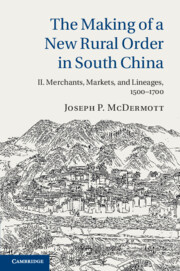Book contents
- The Making of a New Rural Order in South China
- The Making of a New Rural Order in South China
- Copyright page
- Dedication
- Contents
- Tables
- Maps
- Acknowledgments
- Introduction
- 1 Ming Markets and Huizhou Merchants
- 2 Ancestral Halls and Credit
- 3 The Working World of Huizhou Merchants
- 4 Huizhou Merchants and Their Financial Institutions
- 5 Huizhou Merchants and Commercial Partnerships
- 6 Huizhou House Firms
- 7 Conclusion
- Bibliography
- Index
2 - Ancestral Halls and Credit
Building, Investing, and Lending
Published online by Cambridge University Press: 22 June 2020
- The Making of a New Rural Order in South China
- The Making of a New Rural Order in South China
- Copyright page
- Dedication
- Contents
- Tables
- Maps
- Acknowledgments
- Introduction
- 1 Ming Markets and Huizhou Merchants
- 2 Ancestral Halls and Credit
- 3 The Working World of Huizhou Merchants
- 4 Huizhou Merchants and Their Financial Institutions
- 5 Huizhou Merchants and Commercial Partnerships
- 6 Huizhou House Firms
- 7 Conclusion
- Bibliography
- Index
Summary
In exploring how Huizhou men created and used village institutions for their commercial and financial benefit, Chapter 2 analyzes the ascendance of a venerable Confucian institution, the ancestral hall, in the villages of Huizhou and much of southeast China from the late fifteenth through the sixteenth centuries. It won widespread acceptance in Huizhou villages not only as a center of ancestral worship but also as a credit association or proto-bank. In general, it issued two kinds of loan, one at high interest rates to non-hall members to build up the hall’s assets for eventual construction and repair, and another at reduced rates of interest to hall members to provide them with cheap capital. This chapter will investigate the links between ancestral hall finances, ancestral worship ritual, and “grassroots capitalism.”
Keywords
- Type
- Chapter
- Information
- The Making of a New Rural Order in South China , pp. 60 - 124Publisher: Cambridge University PressPrint publication year: 2020

